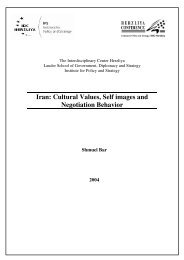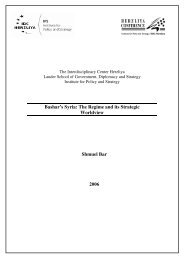Classical Islamic Paradigms of Deterrence and their Expression in ...
Classical Islamic Paradigms of Deterrence and their Expression in ...
Classical Islamic Paradigms of Deterrence and their Expression in ...
Create successful ePaper yourself
Turn your PDF publications into a flip-book with our unique Google optimized e-Paper software.
deterrence strategy must address weaknesses <strong>and</strong> fallacies <strong>in</strong> martyrdom culture. Externally, the credibility<strong>of</strong> the threat <strong>of</strong> retaliation must be <strong>in</strong>timidat<strong>in</strong>g enough to stop the enemy from major hostile actions.Thus, the first question is: does the message reach him? Sub-state actors such as terrorists vary <strong>in</strong> <strong>their</strong>characteristics <strong>and</strong> are difficult to reach. It is much more difficult to develop a deterrence policy aga<strong>in</strong>stMuslim sub-state actors than aga<strong>in</strong>st Muslim state actors. Regional affiliates <strong>of</strong> al-Qaeda stretch from theCaucasus via Central Asia, over the Indian subcont<strong>in</strong>ent, North <strong>and</strong> central Africa, the Arab Middle East <strong>and</strong>Europe. There are numerous networks with clear organizational affiliation as well as small cells <strong>and</strong> even<strong>in</strong>dividuals who adhere to al-Qaeda’s terrorist doctr<strong>in</strong>e <strong>of</strong> global jihad. The common denom<strong>in</strong>ator <strong>of</strong> thesub-state actors is <strong>their</strong> broader ideology, which repeats basic arguments <strong>and</strong> appeal to <strong>in</strong>ternal fears <strong>and</strong>sense <strong>of</strong> devotion. This <strong>in</strong>cludes central fundamentalist myths which serve as glue for Muslim collectiveidentity <strong>and</strong> sense <strong>of</strong> community.In a legal conceptual sense neither specific deterrence, nor general deterrence or <strong>in</strong>capacitation is reallysuccessful aga<strong>in</strong>st jihadi foes. The deterr<strong>in</strong>g factor lies on a collective psychological level. This means, thatone has to meditate the roots <strong>and</strong> causes that make religious terrorists tick. In that sense, one can fight afire with fire. Yet, one has to be very careful not to ignite a wildfire. Jihadi terrorists know very well how toactivate fears <strong>of</strong> Muslims by "div<strong>in</strong>e orders <strong>and</strong> punishment," conspiracy discourses around westernimperialism, anti-semitism, exploitation <strong>of</strong> western military policies; <strong>and</strong> jihadis know how to frightenWesterners by threats <strong>of</strong> <strong>and</strong> perpetration <strong>of</strong> terrorist attacks, which are justified by theological argumentsthat look totally irrational to Western eyes. Acts <strong>of</strong> terrorism are mostly directed at third party actors. Thus,Western <strong>and</strong> Muslim civilians are the victims. As a sad matter <strong>of</strong> fact, they only serve as <strong>in</strong>termediaries tocommunicate a message to the hard targets, i.e. politicians <strong>and</strong> militaries.Words mean<strong>in</strong>g "fear <strong>and</strong> fright" appear 296 times <strong>in</strong> more than 250 verses <strong>of</strong> the Qur'an. Conceptually,these can be split up <strong>in</strong>to abstract, concrete, <strong>in</strong>ternal, external <strong>and</strong> deterr<strong>in</strong>g forms <strong>of</strong> fear. In jihadi belief,correct faith equals militant jihad. Basic <strong>in</strong>junctions on faith, which tell about fear <strong>and</strong> punishment, are<strong>in</strong>terpreted <strong>in</strong> a jihadi sense. The second chapter <strong>of</strong> the Qur'an can serve here as an example. "This is theBook; <strong>in</strong> it is guidance sure, without doubt, to those who fear Allah [muttaq<strong>in</strong>, noun: ittiqa']; […] As to thosewho reject Faith […]great is the penalty ['adhab] they (<strong>in</strong>cur)." 62 The concept <strong>of</strong> fear from God’s punishmentfor misbehavior is concretized <strong>in</strong> another verse <strong>of</strong> the same chapter, as it is projected on the hell-fire, thatsays "then fear [fa-ttaqu] the Fire whose fuel is men <strong>and</strong> stones,- which is prepared for those who rejectFaith." 63The psychological construction <strong>of</strong> deterrence <strong>in</strong> (Sunni-) Islam <strong>and</strong> among its radical sub-sects relies on tw<strong>of</strong>actors. Firstly, <strong>in</strong>ternal abstract fear makes followers obey <strong>and</strong> is generally based on "fear from hell-fire"(khauf (m<strong>in</strong> al-nar)) as well as the more specific fear to break obligations to God (bay'at Allah; ittiqa' Allah)– The <strong>Islamic</strong> credo itself is an oath <strong>of</strong> loyalty to Islam, God <strong>and</strong> his messenger Muhammad, which is takenmost seriously by devout Muslims. As third <strong>and</strong> fourth conceptual elements, there are fears that arelevered aga<strong>in</strong>st the enemy. These concepts carry the names "<strong>in</strong>timidat<strong>in</strong>g fright" (ra'b) <strong>in</strong> an abstract <strong>and</strong>terror (irhab) <strong>in</strong> a more concrete sense. Both concepts <strong>of</strong> fear, the own fear <strong>of</strong> obedience <strong>and</strong> the fear <strong>of</strong>harm levered aga<strong>in</strong>st an enemy, form a strategic meta-category which is called "deterrence" (rad').To underst<strong>and</strong> the <strong>in</strong>ternal abstract <strong>and</strong> concrete fears <strong>of</strong> Muslims is essential for policy makers who wantto develop deterrence strategies as well as peace plans. One must not undervalue the <strong>in</strong>sights which result62 Surat al-Baqara 2:2-7, Yusuf Ali translation, (Accessed May 15, 2012) -http://www.searchtruth.com/chapter_display.php?chapter=2&translator=2#263 Qur'an Surat al-Baqara 2:24, Yusuf Ali translation, (Accessed May 15, 2012) -http://www.searchtruth.com/chapter_display.php?chapter=2&translator=2#2419
















